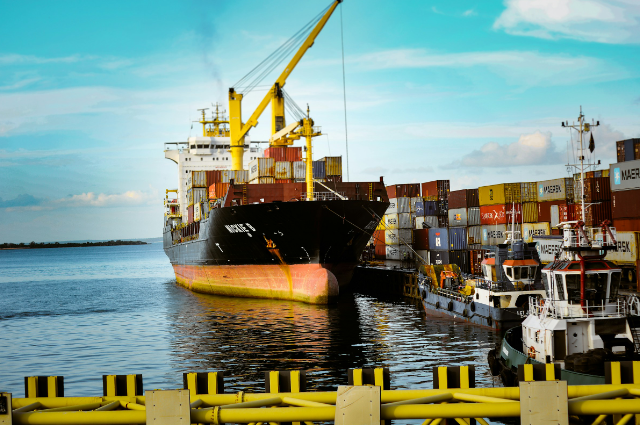
Photo by Picha HD on Unsplash/ Representative Image
India has embarked on a transformative journey in maritime governance with the Rajya Sabha's passing of the Indian Ports Bill 2025 on August 18, 2025. This landmark legislation represents far more than a simple regulatory update; it constitutes a comprehensive reimagining of India's approach to maritime infrastructure and trade facilitation. By replacing the antiquated Indian Ports Act of 1908, the nation has finally shed the constraints of colonial-era legislation that had long hindered its maritime potential.
Union Ports, Shipping and Waterways Minister Sarbananda Sonowal aptly characterised this legislation as a "strategic intervention" designed to reposition India's maritime sector for contemporary global demands. The Bill emerges as a crucial response to the evolving dynamics of 21st-century maritime commerce, where digitalisation, environmental consciousness, and efficient governance have become non-negotiable prerequisites for competitive advantage.
Breaking Free from Colonial Constraints: The Limitations of the 1908 Framework
The previous legislative framework, rooted in the British colonial period, had become increasingly inadequate for modern maritime operations. As Minister Sonowal highlighted, the 1908 Act suffered from critical deficiencies that undermined India's maritime competitiveness. The century-old statute lacked essential provisions for strategic long-term planning and it failed to incorporate modern environmental protection measures and provided no efficient mechanisms for resolving commercial disputes.
These shortcomings were particularly problematic given that maritime trade accounts for over 90% of India's trade volume. The disconnect between India's massive reliance on sea-borne commerce and its outdated regulatory framework created significant operational inefficiencies and limited the country's ability to capitalize on global maritime opportunities.
A Modern Legislative Solution
The Indian Ports Bill 2025 addresses these historical limitations through a comprehensive approach that reflects contemporary best practices in maritime governance. The legislation was developed through extensive consultations with coastal states, industry stakeholders, and the general public, demonstrating the principles of cooperative federalism that have become central to India's governance philosophy.
This collaborative approach ensures that the new framework addresses real-world challenges while accommodating the diverse needs of various stakeholders in India's maritime ecosystem.
Enhanced Government Powers and Planning Capabilities
The new legislation significantly expands the government's capacity for strategic port development by empowering authorities to designate new ports and modify existing port boundaries as needed. This flexibility is crucial for adapting to changing trade patterns and emerging commercial opportunities.
Furthermore, the Bill mandates the formulation of a national perspective plan for maritime trade, ensuring that India's port development strategy aligns with broader economic objectives and international trade trends. This planning requirement represents a fundamental shift from the ad-hoc approach of the past to a more systematic and forward-looking methodology.
Modernization Through Technology and Environmental Integration: Digital Integration and Environmental Standards
The legislation recognizes that modern maritime operations must incorporate cutting-edge technology and stringent environmental safeguards. The Bill specifically addresses the need for digitalized maritime ecosystems, acknowledging that technological integration is essential for competitive port operations in the global marketplace.
Environmental protection receives particular attention through the incorporation of international standards, including compliance with MARPOL (International Convention for the Prevention of Pollution from Ships) and other global environmental conventions. This alignment with international environmental standards positions India as a responsible maritime nation while ensuring sustainable port development.
Beyond institutional reforms, the Bill establishes comprehensive frameworks for integrated port development, tariff regulation, and dispute resolution systems. These elements work together to create an ecosystem that supports efficient operations while maintaining fair commercial practices and providing reliable mechanisms for resolving conflicts.
Given that maritime transport handles over 90% of India's trade volume, the reform initiative is strategically critical for establishing India as a premier maritime hub in the Indo-Pacific region. The legislation provides the regulatory foundation necessary for India to compete effectively with other major maritime nations and attract international shipping and logistics investments.
The India-Singapore Green and Digital Shipping Corridor
A major highlight of India's maritime modernization efforts is the announcement of a Green and Digital Shipping Corridor between India and Singapore. This innovative partnership, unveiled at a significant maritime event in Navi Mumbai attended by over 300 delegates and international experts, focuses on three critical areas: clean fuel adoption, accelerated cargo movement, and comprehensive digital integration.
This corridor represents a pioneering approach to sustainable maritime trade that could serve as a model for similar initiatives with other trading partners. The emphasis on environmental sustainability and technological advancement reflects India's commitment to leading global efforts toward cleaner, more efficient maritime operations.
Infrastructure Development and Capacity Expansion: The Vadhavan Port Project
India's maritime ambitions are perhaps best exemplified by the upcoming Vadhavan Port in Maharashtra, which is designed to handle an impressive 300 million tonnes of cargo annually. According to Chief Minister Devendra Fadnavis, this massive infrastructure project is expected to rank among the world's top 10 ports from its inaugural day of operations.
The Vadhavan Port represents more than just infrastructure development; it embodies India's vision of creating world-class maritime facilities that can compete with the best global ports. The project's scale and ambition demonstrate India's commitment to building the capacity necessary to handle projected increases in maritime trade.
The Indian Ports Bill 2025 represents a watershed moment in India's maritime development journey. By replacing outdated colonial legislation with a comprehensive, modern framework, India has positioned itself to capitalize on the tremendous opportunities presented by global maritime trade growth.
The legislation's emphasis on institutional innovation, environmental responsibility, technological integration, and international cooperation creates a solid foundation for India's emergence as a leading maritime nation. Combined with ambitious infrastructure projects like the Vadhavan Port and innovative partnerships such as the India-Singapore corridor, these reforms signal India's determination to play a central role in shaping the future of global maritime commerce.
As India continues to implement these reforms and develop its maritime infrastructure, the nation moves closer to realizing its potential as a premier maritime hub, capable of serving both domestic economic needs and international trade requirements with equal effectiveness.
. . .
References:
